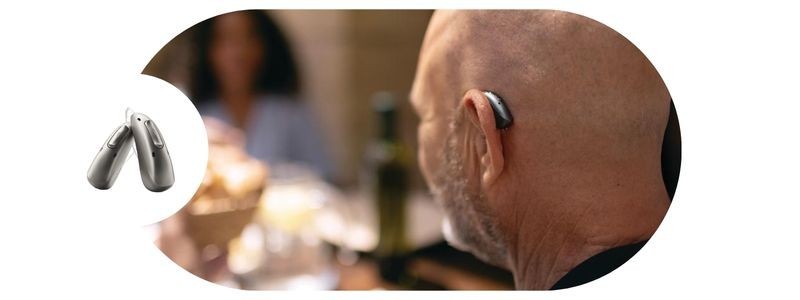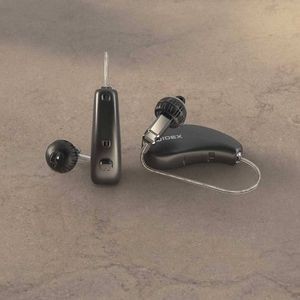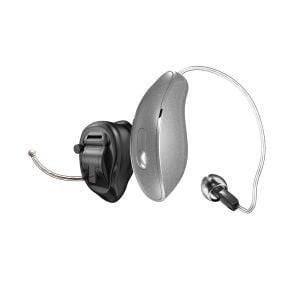Free home visits
with a local audiologist

Head of Online Medical Content

Audiology Expert at Hearing Aid UK

Overview | What is AI in hearing aids? | Industry examples | Features vs benefits | Conclusion
AI technology in hearing aids offers numerous benefits that enhance the user and listening experience even more. By analysing sound environments in real-time, Artificial intelligence can automatically adjust settings for better hearing in various situations. Such as a noisy restaurant or a quiet room.
This ensures clearer speech understanding and reduces background noise, making conversations simply more enjoyable. AI can also learn individual preferences, and over time, provide a more personalised listening experience.
Features like automatic speech recognition and sound classification help users engage more effectively in their surroundings. This article focuses on how AI can help your hearing and, along with it, your quality of life.
For hearing aids to be successful, they need to do a good job of adapting to the wearer's hearing needs, as well as sorting out common challenges such as background noise. Over the years, automated features within hearing aids have really helped wearers gain access to better sound, but one should always look at this from a negative angle too.
Hearing aid automation can sometimes offer something different from what you want or expect. Almost as though it is sacrificing one aspect of the sound you hear for another. If you are a hearing aid wearer you will know that louder isn't the solution.
AI within hearing aids has started a journey that fuses the wearer and AI together to solve everyday listening problems. Automation has had a face-lift and below we talk about how this new generation of hearing can help your everyday listening experiences, as well as weighing up features vs benefits.
We've all come across artificial intelligence in our lives before, but did you know that hearing aids can be powered by AI and can actually help your hearing through personalisation? A technology that can learn and organically grow with you and your preferences - adapting to real-life listening challenges to make hearing simply better and easier.
Artificial Intelligence today is used for many things and is pretty much within every home. From helping you select your next Netflix binge series to the complexities of machine learning and predicting outcomes based on data and learning from actual human decisions.
It's almost as though we don't even give it a second thought, as we steadily become an automated AI generation.
Essentially, AI is when a machine or system is trained by humans to complete tasks and jobs that a human can do. For example, figuring out the fastest commute to work. All this training eventually results in the system being able to predict outcomes and create success criteria. In digital hearing aids, AI helps the devices to function better.
If you are already a hearing aid wearer you might have had the experience of feeling that your hearing aids aren't quite right for you or supporting you the way they should. For instance, you are drinking coffee with a friend in a busy coffee shop, but you also like the music they play.
Your hearing aids automatically adjust to only focusing on speech, but you'd also like to hear the music more as well. Your hearing aids have essentially decided for you and sacrificed one for the other.
Speech is clear, but your spatial awareness and feeling a part of your surroundings have been disregarded. But, what if there was a way in which you could personalise your hearing in real time? A way in which you could hear exactly what you want to, in the moment. This is where AI comes in.

![]()
Hearing aids with AI capabilities can analyse and adapt to the user's listening environment in real time, automatically adjusting the volume and frequency of sound to optimise the listening experience. This can be particularly helpful in noisy environments, where traditional hearing aids may struggle to distinguish between important sounds and background noise.
AI can also be used to improve speech recognition and understanding, particularly in loud environments. Some hearing aids use AI to identify and amplify the sound of the user's own voice, while others can use machine learning algorithms to recognise and prioritise important sounds, such as conversations or alarms.
As well as improving the listening experience, AI can also be used to monitor and track the user's hearing health. Some hearing aids use sensors to collect data on listening habits and the environment, which can be analysed by AI algorithms to identify patterns and trends.
This information can be used to optimise the hearing aid settings for the user or to alert the user or their healthcare provider if there are any changes in their hearing health.
AI can also be used to improve the usability and functionality of hearing aids. For example, some hearing aids use AI to recognise and respond to voice commands, allowing users to easily control their hearing aids without the need for buttons or physical controls.

Widex AI technology: The SoundSense Learn technology, within Widex SmartRIC hearing aids, is a great example of using artificial intelligence to personalise your listening experience. You are offered two sound comparisons to choose from which results in a smarter hearing aid that makes clever decisions.
An AI technology that creates hearing programs developed on your typical soundscape with how often you manipulate the volume and settings in commonplace environments.
Typical environments such as the sounds of your commute, office space and favourite restaurant will be enriched automatically. Or you can keep it simple and take the reins by controlling your hearing aids yourself, it’s all down to what you want.
![]()
Oticon AI technology: There are also the Oticon Intent hearing aids, which include Deep Neural Network technology (DNN) - an AI system that mirrors the way your brain functions. The idea here is that instead of using a sound processor built upon theory and guesstimations - your hearing is enhanced in the most natural way.
The DNN is trained to understand and recognise all common sounds down to the finest detail and how they should be heard, as well as supporting your brain.

Phonak AI technology: If we take a look at the Phonak Audeo Infinio Sphere, this hearing solution uses advanced AI technology in the chip (DEEPSONIC AI and Deep Neural Network chip) that can distinguish between sounds you want to hear. Such as someone speaking directly to you and those you don’t, like the clatter of dishes in a bustling cafe. This capability creates a much more natural listening experience.
The artificial intelligence of hearing aids is all based on data. You, as the wearer, are in control of the preferences set, this data is stored and then assists in training the AI technology and therefore the features you can access in the future.
This personalised information is then used to make better decisions that offer you the best sound in various hearing scenarios you might have struggled with in the past.
However, the main highlight of AI technology within hearing aids is that it overcomes hearing challenges that may not be easily solved by past approaches to signal processing. With time, this is only going to get better, and more efficient.

You might not need all the bells and whistles that AI-powered hearing aids bring and that's something you need to discuss with your audiologist. All the advanced feature specs might not suit your lifestyle. For example, if you live on your own or have a quiet social life with minimal noisy listening scenarios these types of hearing aids might not benefit you.
However, if you have an active lifestyle and social life, you may find investing in AI-powered hearing aids will give you access to a hugely improved hearing experience and a better scope of sound.
Like with most technology you need to think about what you actually want your hearing aids to do. Such as how you want them to support your loss and how you want to hear. AI within hearing aids gives you the opportunity to access more sound and make better sense of what’s going on around you.
This means you are benefitting from a more personalised sound and will simply spend less time trying to work out your soundscape.
This reduces your listening effort and the fatigue that you might experience in tricky listening environments. A more natural listening effort, i.e. one that those with ‘normal’ hearing experience, means you can focus on the conversation in the coffee shop and also enjoy the buzzing atmosphere and music at the same time.
Some AI-powered hearing aids offer fitness tracking and fall detection features – sending an automated message to someone when you have a fall. Appealing to tech-savvy and active individuals and offering peace of mind to loved ones.
But, do you, as an individual, need all that? Do the device’s features out way the benefits? Do you think you’ll be paying more for the features you don’t need?
Yes, hearing aids with Artificial Intelligence are paving the way to a better quality of hearing and potentially other revolutionary breakthroughs as they adopt the processes of existing consumer technology. But it is also important to take your future needs into consideration as well as the ‘here and now’ philosophy.
What do you need to be better now? I advise that you compare the features and benefits of hearing aids in the market and, along with your audiologist, choose what’s right for you.
The audiology industry introduced artificial intelligence within hearing aids fifteen years ago. Before then, various manual programs were the only difference between a hearing aid being able to work in noisy and quiet environments or not. Such as wearers being able to access directional microphones.
So in theory, AI was used when we made the switch from analogue to digital hearing aids in the mid 90's. By the mid-2000s, hearing aid manufacturers started using intelligent AI machine learning to automatically use directionality and noise management to combat challenging listening experiences in specific soundscapes.
As well as evolving the way hearing aids support hearing, artificial intelligence has set the path to a better overall user experience. For example, monitoring health fitness and wellness using sensors to track such social and activity data.
"The use of AI in hearing instruments is not only improving audibility, sound quality, and listening experience, but is being used to support overall health and give peace of mind to the user"*
Dr Dave Fabry - Chief Innovation Officer at Starkey
When interviewed**, Dr Dave Fabry stated that the focus will most likely be on increasing the computer power of hearing aid circuits in the future. Ensuring that innovation results in having as many onboard hearing aids as possible, whilst keeping the sound quality a priority and how the audiologist cares for the patient holistically.
He also implies that artificial intelligence automation will evolve and continue to provide the optimum listening experience for those with hearing loss.
Overall, AI has the potential to significantly improve the listening experience and hearing health of those with hearing loss. By adapting to the user's environment and needs in real time, AI can help to optimise the performance of hearing aids and improve the overall quality of life for users.
Deciding whether or not to use a hearing aid with artificial intelligence (AI) technology is a personal decision that will depend on your specific needs and preferences. Such as the degree of hearing loss, common listening environment, ease of use and price. Discussing your options with a hearing healthcare professional to determine the best solution for you would be invaluable.
►Click here to go to the top of the page
You might be thinking of upgrading your existing hearing aids or researching hearing solutions for the first time - wherever you are on your journey call us free on 0800 567 7621 with any queries and we would be delighted to help.
 Starkey Edge AI Hearing Aids VS Starkey Genesis AI
Starkey Edge AI Hearing Aids VS Starkey Genesis AI  Phonak Audeo Infinio VS Phonak Lumity Hearing Aids
Phonak Audeo Infinio VS Phonak Lumity Hearing Aids  What is Auracast? Is it better than Classic Bluetooth?
What is Auracast? Is it better than Classic Bluetooth? Do not spend hundreds of pounds without getting a second opinion from us.
 Not only are the prices great, but the service is fantastic! Many thanks to your team.
Not only are the prices great, but the service is fantastic! Many thanks to your team.If you are looking at this page then it is likely that an audiologist has suggested that you purchase this particular hearing aid, so is this the best model for you?
In general, any audiologist will always recommend to you the model that best suits your needs. Here is a useful checklist to make sure that is the case.
If in doubt, feel free to give us a call. That's what we're here for. In the meantime, read all about our review of the best hearing aids for 2025 here
If you have significant hearing loss in both ears, you should be wearing two hearing aids. Here are the audiological reasons why:
Localisation: The brain decodes information from both ears and compares and contrasts them. By analysing the minuscule time delays as well as the difference in the loudness of each sound reaching the ears, the person is able to accurately locate a sound source. Simply put, if you have better hearing on one side than the other, you can't accurately tell what direction sounds are coming from.
Less amplification is required: A phenomenon known as “binaural summation” means that the hearing aids can be set at a lower and more natural volume setting than if you wore only one hearing aid.
Head shadow effect: High frequencies, the part of your hearing that gives clarity and meaning to speech sounds, cannot bend around your head. Only low frequencies can. Therefore if someone is talking on your unaided side you are likely to hear that they are speaking, but be unable to tell what they have said.
Noise reduction: The brain has its own built-in noise reduction which is only really effective when it is receiving information from both ears. If only one ear is aided, even with the best hearing aid in the world, it will be difficult for you to hear in background noise as your brain is trying to retain all of the sounds (including background noise) rather than filtering it out.
Sound quality: We are designed to hear in stereo. Only hearing from one side sounds a lot less natural to us.
Fancy some further reading on this topic? You can read about why two hearing aids are better than one in our article, hearing aids for both ears, here
For most people, the main benefit of a rechargeable hearing aid is simple convenience. We are used to plugging in our phones and other devices overnight for them to charge up. Here are some other pros and cons:
For anybody with poor dexterity or issues with their fingers, having a rechargeable aid makes a huge difference as normal hearing aid batteries are quite small and some people find them fiddly to change.
One downside is that if you forget to charge your hearing aid, then it is a problem that can't be instantly fixed. For most a 30-minute charge will get you at least two or three hours of hearing, but if you are the type of person who is likely to forget to plug them in regularly then you're probably better off with standard batteries.
Rechargeable aids are also a little bit bigger and are only available in Behind the Ear models.
Finally, just like with a mobile phone, the amount of charge you get on day one is not going to be the same as you get a few years down the line. Be sure to ask what the policy is with the manufacturer warranty when it comes to replacing the battery.
Looking for more information on rechargeable hearing aids? Read our dedicated page on the topic here
For most people, the answer is yes. But it's never that simple.
The majority of hearing problems affect the high frequencies a lot more than the low ones. Therefore open fitting hearing aids sound a lot more natural and ones that block your ears up can make your own voice sound like you are talking with your head in a bucket. Therefore in-ear aids tend to be less natural.
However the true answer is we can't tell until we have had a look in your ears to assess the size of your ear canal, and until we have tested your hearing to see which frequencies are being affected.
People with wider ear canals tend to have more flexibility, also there are open fitting modular CIC hearing aids now that do not block your ears.
There is also the age old rule to consider, that a hearing aid will not help you if it's sat in the drawer gathering dust. If the only hearing aid you would be happy wearing is one that people can't see, then that's what you should get.
Most people can adapt to any type of hearing aid, as long as they know what to expect. Have an honest conversation with your audiologist as to what your needs are.
Generally speaking, six or more. Unless it's none at all.
The number of channels a hearing aid has is often a simplistic way an audiologist will use to explain why one hearing aid is better than another, but channels are complex and it is really not that straightforward. Here are some reasons why:
Hearing aids amplify sounds of different frequencies by different amounts. Most people have lost more high frequencies than low and therefore need more amplification in the high frequencies. The range of sounds you hear are split into frequency bands or channels and the hearing aids are set to provide the right amount of hearing at each frequency level.
Less than six channels and this cannot be done with much accuracy, so six is the magic number. However, a six channel aid is typically very basic with few other features and is suitable only for hearing a single speaker in a quiet room. The number of channels is not what you should be looking at, it's more the rest of the technology that comes with them.
As a final note, different manufacturers have different approaches. One method is not necessarily better than any other. For example, some manufacturers have as many as 64 channels in their top aids. Most tend to have between 17 and 20. One manufacturer has no channels at all.
Hearing aids are easily lost, misplaced or damaged and typically are one of the most expensive personal possessions an individual can own. We offer hearing aid warranty coverage for £80 per year per aid. Find out more about this service we provide here
All our audiologists use the very latest technology and provide the full range of tests to accurately measure your hearing for free. Find out about what hearing healthcare services we offer all our customers here
Hearing Aid UK offers all their customers free home visiting services, even in a care home environment, for no extra cost. Including hearing tests, fittings, maintenance, check-ups and much more in the comfort of your own home and at your convenience. Find out more information about our home visits here
Here, at Hearing Aid UK, we are dedicated to offering low hearing aid prices. We achieve this by having no head office and low marketing costs. Our hearing aid prices are amongst the lowest you will find anywhere in the world. Explore our prices, brands, and models here
When we refer to a product as 'Latest Launch', we mean it is the latest to be released on the market.
When we refer to a product as 'New', we mean that the product is the newest hearing aid model on the market.
When we refer to a product as 'Superseded', we mean that there is a newer range available which replaces and improves on this product.
When we refer to a product as an 'Older Model', we mean that it is has been superseded by at least two more recent hearing aid ranges.